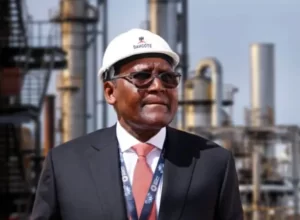
Can NNPC”s refinery face Dangote refinery without crackers?
Sopuruchi Onwuka
The statement from the Nigerian National Petroleum Company (NNPC) Limited that it’s 60,000 barrels per day Port Harcourt refinery now accounts for supply of 200 trucks of petrol into the domestic market leaves a clear curiosity gap that threatens the credibility of the company.

From the information consistently pumped out by its group spokesman, Olufemi Soneye, NNPC sells the impression that it has started producing petrol from a plant that has no design capacity to do so.
The Oracle Today reports that the old Port Harcourt refinery built by Shell and confiscated by the Nigerian government is not designed to churn out petrol. It does not have the fluid catalytic crackers required to produce the premium motor spirit. It therefore cannot also produce liquefied petroleum gas (LPG) also called cooking gas.
The small refinery is Nigeria’s oldest and was specifically built to produce distillates and other products used by the former Eleme Petrochemical Company Limited (EPCL) which has been acquired and now operated by Indorama.
Investigation by The Oracle Today shows that NNPC only produces naphtha at the old Port Harcourt refinery and blends it into imported high octane gasoline to achieve a low grade petrol for supply to the domestic market.
Soneye said the old Port Harcourt refinery currently operates at 70 percent installed capacity. This translates to processing of some 42000 barrels per day of crude oil to produce different quantities of naphtha and various distillates including kerosene, fuel oils and sundry nonfuel products.
He did not specify the actual volume of naphtha produced at the plant.
He however stated that the naphtha is now blended with some 1.4 million liters of petrol to arrive at a standard petrol specification for the domestic market.
He did not also specify the source of the 1.4 million liters of high octane gasoline used in blending naphtha at the refinery.
Soneye’s statement never mentioned any certification of the blended product by any regulator in the country, including the Nigerian Midstream and Downstream Petroleum Regulatory Authority (NMDPRA).
The information the NNPC appears to withhold is that it has continued and will continue to import cargoes of high octane gasoline to maintain output from the refinery unit the newer 150,000 barrels per day Port Harcourt refinery comes back online.

The Oracle Today reports that the newer Port Harcourt refinery hosts a fluid catalytic cracking unit (FCCU) which would now produce premium motor spirit (PMS) for blending with the naphtha produced at the old sister refinery.
Our investigation shows that NNPC is currently in deal with traders for delivery of gasoline cargoes of Reid Octane Number (RON) of about 95 min.
In an order letter to one of it’s suppliers, NNPC directed that the imported petrol be delivered at the old Port Harcourt refinery in batches of no larger than 30,000 tons each to avert narrow waterway challenges.
The order also makes it clear that the gasoline cargoes are for blending naphtha produced at the discharge point.
With 1.4 million liters required to blend naphtha output from refining 42000 bbl/d, the total truck out volume would be far lower than 200 trucks of average 33000 liters.
Therefore, it must have taken greater volumes of imported products to meet over 6.6 million liters required for daily haul of 200 trucks.
The question comes to mind why it has become urgent for the national oil company to fast track a plant rehabilitation project that has lingered for several years.
Next question is why NNPC has again taken the costly route to market when it is clear that the volume of naphtha it produces at the old Port Harcourt refinery cannot offset the cost differential on huge high octane gasoline imports.
Yes. There is a fierce scramble for domestic and regional market share with the Dangote refinery. And NNPC is handicapped and actually depends on its competitor to meet its local supply obligations.
Will resumption of high cost importation provide the stead for competition with a local refiner? Will this arrangement withstand market forces?
It appears NNPC is playing a game Dangote clearly understands. And the emerging price war once again boxes the national oil company into a tight corner.

Dangote has, upon resumption of supplies from the old Port Harcourt refinery, slashed petrol prices to a level NNPC Limited may not descend with imported petrol.
And customers of the NNPC refinery now benchmark prices with rates at Dangote refinery.
The Oracle Today learnt that the management of NNPC is currently scratching its head on how to respond to demands for price cut.
In a scheduled meeting, the national oil company would now host different marketing groups to a discussion on cost reflective prices for different products emerging from the old Port Harcourt refinery.
Fears are that the NNPC cannot visibly face competition with Dangote refinery under the prevailing adverse situations without running into deep losses.



